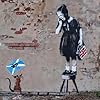Sujoy Desai
asked:
What's the difference between Brave New World and Brave New World Revisited? Is Revisited like an updated version or a supplement? Which one should I read first?
To answer questions about
Brave New World and Brave New World Revisited,
please sign up.
Christopher (Donut)
BRAVE NEW WORLD is an amazing SF novel, a deft satire of the tendencies of modern civilization.
BNWR is a humdrum collection of boring essays, which prove almost beyond a doubt that Huxley had no idea of the greatness he had envisioned. For instance, he acts as though the most salient issues addressed in the novel were overpopulation and mind control via propaganda, whereas he has nothing to say about, e.g., diminishing emotion through easy sexual gratification (everyone belongs to everyone else), the possibility of poetry and philosophy among elites at "the end of history," etc.
In short, the contrast between the greatness of the one, and the mediocrity of the other could not be starker.
BNWR is a humdrum collection of boring essays, which prove almost beyond a doubt that Huxley had no idea of the greatness he had envisioned. For instance, he acts as though the most salient issues addressed in the novel were overpopulation and mind control via propaganda, whereas he has nothing to say about, e.g., diminishing emotion through easy sexual gratification (everyone belongs to everyone else), the possibility of poetry and philosophy among elites at "the end of history," etc.
In short, the contrast between the greatness of the one, and the mediocrity of the other could not be starker.
Jana Giles
I prefer the essays. They are as relevant and piercing as they were 90 years ago. The satirical novel is effective but sometimes clumsy. Read novel first, essays second. The essays are not a commentary on the novel per se; he does dispute with Orwell about whether hard or soft power will dominate totalitarian governments, and the main thrust of the essays is to argue for soft power. I'd say that soft totalitarianism (Huxley's) is what "democratic," capitalist governments practice, while hard power (Orwell's) is practiced by governments more typically recognized as oppressive (Stalinism, etc.)
John Kitcher
It includes an additional set of chapters looking at how the world is (at the time of writing) compared to how the author saw the world then (when the book was written). From Amazon:
"Following Brave New World is the nonfiction work Brave New World Revisited, first published in 1958. It is a fascinating work in which Huxley uses his tremendous knowledge of human relations to compare the modern-day world with the prophetic fantasy envisioned in Brave New World, including threats to humanity, such as overpopulation, propaganda, and chemical persuasion."
"Following Brave New World is the nonfiction work Brave New World Revisited, first published in 1958. It is a fascinating work in which Huxley uses his tremendous knowledge of human relations to compare the modern-day world with the prophetic fantasy envisioned in Brave New World, including threats to humanity, such as overpopulation, propaganda, and chemical persuasion."
About Goodreads Q&A
Ask and answer questions about books!
You can pose questions to the Goodreads community with Reader Q&A, or ask your favorite author a question with Ask the Author.
See Featured Authors Answering Questions
Learn more





